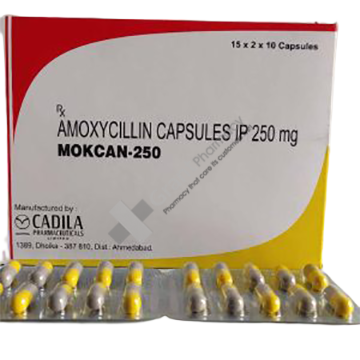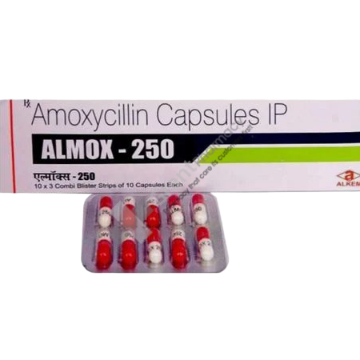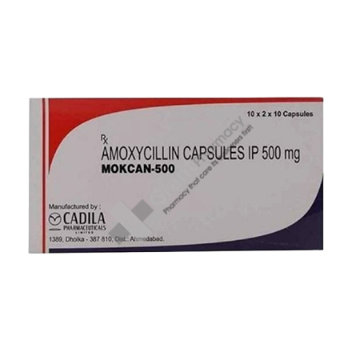







In the realm of healthcare, antibiotics play a crucial role in combating bacterial infections and safeguarding public health. Among these essential medications, amoxicillin stands out as a versatile and effective option. Let's delve into the intricacies of amoxicillin, its applications, and the broader context of antibiotic usage in healthcare.
Amoxicillin, a type of antibiotic, is widely prescribed by healthcare providers to treat various bacterial infections. Its primary function is to inhibit the growth of bacteria, thereby alleviating symptoms and aiding in recovery.
They are indispensable tools in modern medicine, enabling healthcare professionals to tackle a wide array of infectious diseases effectively.
Bacterial infections encompass a broad range of illnesses, from minor ailments to life-threatening conditions. Examples include strep throat, urinary tract infections (UTIs), and pneumonia. Prompt treatment with appropriate antibiotics like amoxicillin is essential to prevent complications and promote recovery.
Factors contributing to this phenomenon include overuse and misuse of Antibiotic Resistance, as well as inadequate infection control measures.
Amoxicillin is prized for its effectiveness against various infections, including respiratory tract infections, ear infections, and skin infections. It works by disrupting the formation of bacterial cell walls, ultimately leading to bacterial death.
One of the key advantages of amoxicillin is its versatility in treating a wide range of bacterial infections. It is commonly used in both adults and children, making it a valuable asset in primary care and hospital settings alike. Penicillin Antibiotic was discovered to treat bacterial infections like strep throat, ear infections, and urinary tract infections. The discovery of penicillin in 1928 started the golden age of natural product antibiotic discovery that peaked in the mid-1950s.

Seeking guidance from a good healthcare provider is paramount when it comes to antibiotic target usage. They can prescribe the appropriate dosage of amoxicillin based on the specific infection and individual factors. Additionally, they can provide essential instructions regarding the duration of treatment and potential side effects.
Like all medications, amoxicillin has a limited shelf life. It is crucial to adhere to expiration dates and proper storage conditions to maintain its efficacy. Disposing of expired or shelf-life completed medicines responsibly helps prevent misuse and environmental contamination. It is important to check the expiration dates of the items.
Amoxicillin is utilized in the treatment of sexually transmitted infection(STIs), such as chlamydia. However, comprehensive STI prevention and management strategies encompass more than just antibiotic therapy.
Measures such as antibiotic stewardship programs, infection control protocols, and research into novel antimicrobial agents are essential for combating this global threat.
Numerous real-life examples underscore the efficacy of amoxicillin in treating bacterial infections and improving patient outcomes. From routine infections to more severe conditions, amoxicillin has played a pivotal role in saving lives and alleviating suffering worldwide.
In the battle against infectious diseases, antibiotics play a pivotal role, and amoxicillin stands out as a cornerstone in this fight. From common bacterial infections to severe cases, amoxicillin has been a trusted remedy for decades, showcasing its efficacy and versatility in combating various strains of bacteria.
These bacteria have evolved to withstand the effects of antibiotics, making infections harder to treat and increasing the risk of complications. The emergence of resistant strains emphasizes the urgent need for new and effective antibiotics to combat these evolving pathogens.
Amoxicillin belongs to the penicillin group of antibiotics and works by inhibiting the growth of bacteria. It targets a wide range of bacterial strains, making it effective against various infections, including respiratory, urinary tract, and skin infections. By disrupting the bacterial cell wall synthesis, amoxicillin (penicillin) effectively kills the bacteria, halting the progression of the infection.
To ensure the effectiveness of amoxicillin treatment and minimize the risk of resistance, it's crucial to adhere to prescription guidelines. Patients should carefully read the prescription label and follow the recommended dosage and frequency of administration. Additionally, choosing the correct dosage form, whether capsules or oral suspension, is essential for optimal absorption and efficacy.
In cases of severe infections, amoxicillin plays a vital role in providing rapid and effective treatment. Its broad-spectrum activity allows for the management of a wide range of bacterial pathogens, providing relief to patients suffering from serious illnesses. However, it's important for healthcare professionals to prescribe amoxicillin judiciously, reserving it for cases where it's truly necessary to minimize the risk of resistance development.

The discovery of amoxicillin Antibiotic Discovery, along with other antibiotics, has revolutionized the field of medicine and saved countless lives. Since its introduction, amoxicillin has remained a cornerstone antibiotic, continually contributing to the fight against infectious diseases. Ongoing research and development efforts aim to further enhance the effectiveness of amoxicillin and address emerging challenges posed by antibiotic resistance.
Antibiotics play a crucial role in modern medicine, combating bacterial infection and restoring health to millions worldwide. Among these life-saving medications, Amoxicillin stands out as a widely prescribed and effective option. In this blog, we'll delve into the intricacies of Amoxicillin, exploring its mechanisms, uses, precautions, and more.
Amoxicillin targets certain bacterial infections by interfering with their ability to build protective cell walls. This disruption weakens the bacteria, making it easier for the body's immune system to eradicate them. By specifically targeting bacteria, Amoxicillin minimizes harm to human cells, leading to a swift recovery from infections.
Amoxicillin is commonly prescribed to treat a variety of certain bacterial infections, including respiratory tract infections, urinary tract infections, certain bacterial infections, and skin infections. You can order Amoxicillin from Grant Pharmacy.
Get it from Grant Pharmacy, a trusted name in healthcare, that ensures the availability of quality medications, including Amoxicillin, to meet patients' needs. However, proper storage is crucial to maintain Amoxicillin's effectiveness. It should be kept in a cool, dry place away from moisture and sunlight to prevent degradation.
Amoxicillin is typically taken orally, either with or without food, as directed by a healthcare professional. The dosage varies depending on the severity of the infection and the patient's age and weight. It's essential to complete the full course of Amoxicillin, even if symptoms improve, to prevent the development of antibiotic resistance.
Common side effects may include nausea, diarrhea, and allergic reactions. It's essential to discuss any concerns with your doctor and report any adverse reactions promptly. Additionally, precautions should be taken, such as informing healthcare providers of any allergies or medical conditions before taking Amoxicillin.
Certain drugs and drug rash amoxicillin or substances may interact with Amoxicillin, amoxicillin itching, affecting its effectiveness or increasing the risk of side effects. It's essential to inform your doctor of all medications, supplements, or herbal remedies you are taking to avoid potential interactions. Additionally, Amoxicillin is contraindicated in individuals with a history of allergic reactions to penicillin or cephalosporin antibiotics. You can also take Amoxicillin and Advil together.
Pediatric dosing of Amoxicillin is based on the children 's weight and age to ensure safety and efficacy. Parents should carefully follow the prescribed dosage and administration instructions provided by their child's healthcare provider. Additionally, liquid formulations of Amoxicillin are available for young children who may have difficulty swallowing tablets or capsules.
Elderly patients may require dosage adjustments when taking Amoxicillin due to age-related changes in kidney function. Healthcare providers may recommend lower doses or longer intervals between doses to prevent adverse effects. Close monitoring is essential to ensure optimal therapeutic outcomes in elderly patients.
Amoxicillin is generally considered safe for use during pregnancy, especially when the benefits outweigh the risks. However, pregnant women should consult their healthcare provider before taking any medication to discuss potential risks and benefits.
Despite its efficacy, the overuse and misuse of Amoxicillin can lead to the development of bacterial resistance, rendering the medication less effective over time. Healthcare providers must prescribe Amoxicillin judiciously, following guidelines to minimize the risk of resistance and preserve its effectiveness for future use.
In some cases, Amoxicillin may be prescribed in combination with other medications to enhance its efficacy or broaden its spectrum of activity. Combination therapies are particularly useful in treating complex or resistant infections, where a single antibiotic may not be sufficient. Healthcare providers carefully consider the benefits and risks of combination therapy to ensure the best possible outcomes for patients.
Research and development efforts continue to explore new formulations and delivery methods for Amoxicillin, as well as strategies to combat antibiotic resistance. The future of Amoxicillin holds promise, with ongoing innovation aimed at improving its effectiveness, safety, and accessibility for patients worldwide.
In the realm of antibiotics, few are as widely used and trusted as amoxicillin capsules. These tiny capsules pack a powerful punch against bacterial infections, making them a cornerstone in disease control and treatment. Let's delve deeper into what makes amoxicillin such a crucial medication and how it serves as a reliable ally in combating various ailments.
Amoxicillin capsules contain the active ingredient amoxicillin, which works by interfering with the formation of bacterial cell walls. This disruption weakens the bacteria, ultimately leading to their demise. Unlike some antibiotics, amoxicillin is effective against both Gram-positive and Gram-negative bacteria, enhancing its utility in clinical practice.
The primary target of amoxicillin is bacterial cell walls. By inhibiting the synthesis of peptidoglycan, a crucial component of the cell wall, amoxicillin renders bacteria vulnerable to the body's natural defense mechanisms and other antibiotics. This mode of action is particularly effective against rapidly multiplying bacteria, making amoxicillin invaluable in treating a wide array of infections. Visit the Reputable Grant Pharmacy's official website to order your medicine today!
One of the key roles of amoxicillin is in disease control. From common ailments like urinary tract infections and respiratory tract infections to more severe conditions such as pneumonia and meningitis, amoxicillin plays a pivotal role in limiting the spread of certain bacterial infections and diseases. Its ability to swiftly eradicate bacterial pathogens helps prevent the escalation of infections, thereby safeguarding public health.
Amoxicillin finds applications across various medical specialties and special considerations. It is commonly prescribed for infections of the ear, nose, throat, skin, and urinary tract. Additionally, amoxicillin is frequently used in dental infections, highlighting its versatility in addressing different clinical scenarios.
When it comes to using amoxicillin, adherence to proper dosage and administration guidelines is paramount. Dosage recommendations may vary depending on the type and severity of the infection, as well as the patient's age and medical history.
Like any medication, amoxicillin is not without side effects. Common side effects may include nausea, diarrhea, and allergic reactions. In rare cases, more severe side effects such as liver damage or blood disorders may occur. It's essential to be aware of these potential side effects and seek medical attention if they occur.
Amoxicillin may interact with certain medications, including oral contraceptives and blood thinners. It's crucial to inform your healthcare provider about all medications you're taking, including over-the-counter drugs and supplements, to avoid potential interactions. Your healthcare provider can help assess the risk of interactions and adjust your treatment plan accordingly.
While amoxicillin is generally safe and well-tolerated, it's essential to use it responsibly. Avoid using leftover antibiotics from previous treatments and never share antibiotics with others.
Amoxicillin remains a cornerstone of antibiotic therapy, offering effective treatment for a wide range of bacterial infections. Its availability, safety profile, and proven efficacy make it a valuable asset in the fight against infectious diseases. By understanding how Amoxicillin works and following proper usage guidelines, we can continue to harness its benefits while minimizing the risk of resistance and ensuring a healthier future for all.

While Amoxicillin can help treat infections that may be causing pain, it is not primarily prescribed as a pain reliever. It targets bacterial infections rather than providing direct pain relief.
Common side effects of Amoxicillin may include diarrhea, nausea, vomiting, and rash. More severe side effects are rare but can include allergic reactions such as difficulty breathing or swelling of the face, lips, or tongue.
Inform your healthcare provider about any allergies, medical conditions, or medications you are currently taking, as they may affect the suitability or dosage of Amoxicillin for you. Also, complete the full course of antibiotics prescribed, even if you start feeling better before it's finished.
No, Amoxicillin is generally not effective against infections caused by Pseudomonas aeruginosa, as this bacterium is often resistant to it. Your healthcare provider may prescribe alternative antibiotics for such infections. You can use Azithromycin as a substitute for Amoxicillin.
You may start to notice improvement in your symptoms within a few days of starting Amoxicillin, but it's important to complete the full course of antibiotics as prescribed, even if you start feeling better.
While Amoxicillin is primarily taken via mouth, in certain cases, such as severe infections or for patients unable to swallow pills, it may be administered intravenously in a healthcare setting.
Yes, the price of Amoxicillin may vary between pharmacies and healthcare providers. It's advisable to compare prices and consider using generic versions, which are often more affordable, if suitable for your condition.



